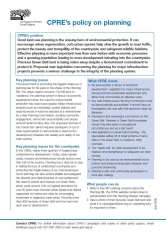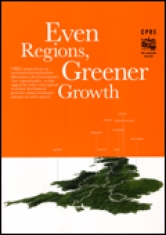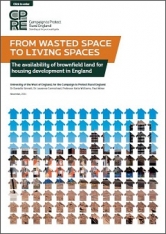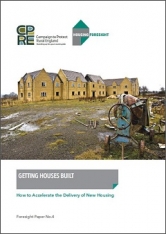Housing and planning
CPRE's policy on brownfield land
Land is a precious resource, and must be used wisely. CPRE supports a ‘brownfield first, greenfield last’ strategy as a general principle. However, just because a site is brownfield does not mean it should necessarily be developed.
CPRE's policy on housing
CPRE believes that a healthy, thriving countryside is important for everyone, no matter where they live. Our approach to housing policy embodies this belief. Good planning should provide everyone with a decent home they can afford. While housing development can have a significant landscape impact we believe it is possible to avoid sporadic development in the countryside and the unsustainable sprawl of our towns and cities. Meeting the housing needs of rural communities is particularly important if they are to thrive. In the national context of a growing and changing population it is important to meet the need for new housing in England. This document outlines how CPRE believes this can be done without unnecessarily damaging the countryside.
CPRE's policy on planning
Good land-use planning is the unsung hero of environmental protection. It can encourage urban regeneration, curb urban sprawl, help slow the growth in road traffic, protect the beauty and tranquillity of the countryside and safeguard wildlife habitats. Effective planning is more important now than ever before with economic pressures and a growing population leading to more development intruding into the countryside. Precious Green Belt land is being eaten away despite a Government commitment to protect it. Proposed new legislation concerning the planning for major infrastructure projects presents a serious challenge to the integrity of the planning system.
CPRE's policy on regeneration of the Thames Estuary
This policy position statement sets out the background to CPRE’s interest in regeneration of the Thames Estuary and the principles by which we think the area should be planned over the coming decades. It represents the combined views of the CPRE Essex, CPRE Kent and CPRE London branches as well as national CPRE.
CPRE's policy on the Oxford-Milton Keynes-Cambridge Arc
This policy position statement sets out the background to CPRE’s interest in the Cambridge – Milton Keynes – Oxford Arc and the principles by which we think the area should be planned over the coming decades.
In November 2017, the Government's National Infrastructure Commission (NIC) recommended 1 million new homes and 1.1 million new jobs should be created in this area by 2050.
In this statement, we set out a series of principles that the Government should follow in its response to the NIC. They are:
- We should aim to protect and enhance the countryside, landscape and heritage assets.
- There are other parts of England, particularly in the Midlands and northern regions, that need regeneration and merit investment more than the area of the Arc.
- In housing, the main priority should be providing the affordable housing needed by existing residents supported by sustainable public transport.
- Sustainable transport at all levels, including East-West Rail, should be supported and prioritised over new road-building.
- There needs to be wide-scale public engagement and consultation both on the overall growth proposals and on the Expressway proposal.
CPRE's response to the Affordable Housing Commission call for evidence
We all have the right to a home we can afford to live in, wherever we are. CPRE’s response to the independent Affordable Housing Commission, chaired by Lord Best, argues that the sustainability of rural communities depends on providing good homes that local people can afford. We note that, while the causes of unaffordable housing are largely similar across urban and rural areas, the impacts on rural communities are distinct and profound.
Our response focuses on four key policy areas in need of reform, if we are to deliver the homes our villages and market towns need to thrive:
- The inflated cost of land.
- A lack of capital investment in high quality social housing.
- A flawed definition of affordability tied to the market rather than to local incomes.
- A planning system which holds local authorities accountable for the failure of the private housebuilding industry to deliver enough homes.
We look at how these challenges play out in a rural context, and what changes could improve the system so that communities get more of the things they want from development.
CPRE's response to the Raynsford Review's Call for Evidence
The Raynsford Review is carrying out an appraisal of the kind of planning system that England needs. It aims to identify how the Government can reform the English planning system to make it fairer, better resourced and capable of producing quality outcomes, while still encouraging the production of new homes.
CPRE have responded to a call of evidence and you can find our response to each of the six themes below. Evidence will continue to be collected and examined over the coming months, with a report presented at all major party conferences in autumn 2018.
Even Regions, Greener Growth
A major new report highlighting the link between disparities in economic performance between the English regions and the consequences for the environment and quality of life. The report sets out for the first time how continuing urban decay and population loss in the less prosperous areas is coupled with sprawling development and worsening congestion in others. It challenges the Government to ensure that, rather than exacerbating these problems by relaxing planning controls and building more infrastructure, the drive for a more even pattern of economic growth promotes an urban renaissance and protects the countryside in all regions.
From Wasted Space to Living Spaces
The availability of brownfield land for housing development in England
The Campaign to Protect Rural England commissioned University of the West of England (UWE) researchers to calculate an accurate figure for housing capacity on suitable brownfield land and specify how such land might be brought forward for development. To explore this further, the report considers the economic and policy drivers for brownfield development and how they can bring sites back into use, and analyses a number of local authority approaches to identifying land and engaging with local communities.
Getting Houses Built
How to accelerate the delivery of new housing
This fourth report in CPRE's Housing Foresight series looks at how to accelerate the delivery of new housing in England.







